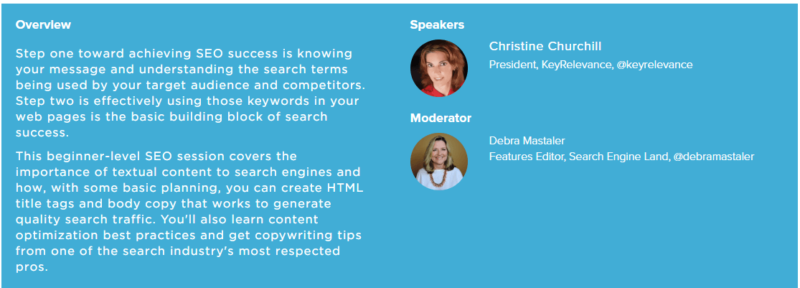 The Ask the SMXpert series continues the question and answer (Q&A) segment of sessions held at Search Marketing Expo (SMX) West 2018.
The Ask the SMXpert series continues the question and answer (Q&A) segment of sessions held at Search Marketing Expo (SMX) West 2018.
The following Q&A is from the Keyword Research and Copywriting for Search Success Bootcamp with Christine Churchill, with an introduction by moderator Debra Mastaler.
Moderator Debra Mastaler: Well-known for her in-depth knowledge of keyword research and online marketing, Christine is one of the few well-rounded search professionals with equal knowledge of search engine optimization (SEO) and pay-per-click (PPC) tactics.
She has been a working in the search industry since 1998 and has worked with some of the biggest brands in the world. Her biggest tip for search marketers today? “Be well-rounded and keep learning.” Wise words.

Question: For businesses that have multiple locations in different states across the US, how can you find keywords specific to different regions? (The assumption seems to be that we all use the same words across the country, but [that’s] not necessarily true).
Christine: My favorite tool for comparing the regional use of keyword phrases is the Google Trends tool. If you enter keyword phrases into the Google Trends tool, it will show you visually the popularity variations where the phrase is used. Google Trends lets you drill down more granularly to look at the keyword usage by the country, subregion, state or even city.

Seeing the map with keyword data is a fast, fun way to learn about the regional use of phrases — and the data comes straight from Google. In order to identify variant terms, you can use the Google Search Console or even a thesaurus or regional language dictionary, though the latter may not keep up with emerging keyword phrase usage.
Question: What are some best practices for optimizing keywords through social media? Have you seen any success with this?
Christine: One of the best practices you can do in social media is to remember to actually use keywords! Tweets, Instagram shares and Pinterest pins are all opportunities for focused, targeted responses if one would keep their keywords in mind.
Including a keyword in a tweet or in your blog post title can increase the ease with which people find your tweet or post. People use the search box on Twitter and other social media sites, and when they use it they usually enter keyword phrases. Just like with Google, using keywords in your social media work helps you be more relevant and get found.
Question: How do B2B voice search trends compare to B2C voice search trends? Are they rising in the same way?
Christine: Excellent question! Voice search is growing fast. According to Mary Meeker’s annual Internet trends report, voice-related commands have gone up 35 percent since 2008.

Voice search is growing across all demographics, but especially younger demographics. Business-to-business (B2B) keyword text search volumes tend to have smaller overall volumes than business-to-consumer (B2C) keywords. As more people adopt voice search [in] their daily activities, the expectation is that they will use voice search for B2B much like they use it for B2C.
More information from the search engines on keyword voice search is needed, to be sure. Optimizing for voice search, whether it is for B2B or B2C, is similar. In order to optimize for voice, plan to use longer keyword phrases in conversational speech patterns and include questions and answers on your pages. Focus on making your website mobile-friendly and fast-loading as well.
Question: You mentioned a few dozen keyword research tools. So many! Can you name your top four favorites and what you like about each?
Christine: Sure! The four keyword tools I use the most are:
The Google Keyword Planner. It provides keyword data from the search engine with the largest search volume, so it is a good idea to start with this tool. That said, it is very oriented toward pay-per-click (PPC), so I usually use it in combination with other tools. The Google Keyword Planner provides keyword popularity information, which is valuable for judging the traffic potential of a keyword phrase.
Ahrefs. A keyword tool that is often overlooked, Ahref’s Keywords Explorer is handy for getting quick overviews on organic competition and trends. I also use Ahrefs as my go-to tool for linkage information.
SEMrush. I use this tool daily. You can enter a domain name or a keyword and get competitive intelligence data in seconds. They have also added a number of helpful tools to SEMRush that can scan your site for problems or give insights on competitors’ links.
Google Trends. Another tool I use in great frequency is Google Trends. I think many people overlook the importance of understanding a keyword’s seasonality and trend line. It also provides insights on the regional use of terms and upcoming related phrases. Since it does not provide an absolute popularity scale, it is best used for comparing the relative popularity of different terms.

I mentioned a number of keyword tools because no one tool is perfect, and using multiple tools synergistically is a great idea.
Have more questions for our SMXpert Christine?
Complete this form and we’ll run your question and the SMXpert responses shortly!
Interested in the rest of Christine’s program? Click here for the full keyword research and SEO copywriting presentation.
Want to learn more in-depth SEO & SEM tactics? Join us next month at our SMX Advanced conference in Seattle, where top industry experts will share their tips, tactics and strategy around these topics and more:
- SEO Ranking Factors In 2018: What’s Important, What’s Not
- Solving Complex SEO Problems When Standard Fixes Don’t Apply
- Optimizing For Voice Search & Virtual Assistants
- Voice Assistants: Persona Design, Information Discovery and the Next Era of Search Marketing
Contributing authors are invited to create content for Search Engine Land and are chosen for their expertise and contribution to the search community. Our contributors work under the oversight of the editorial staff and contributions are checked for quality and relevance to our readers. The opinions they express are their own.



